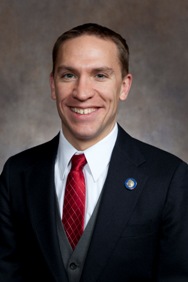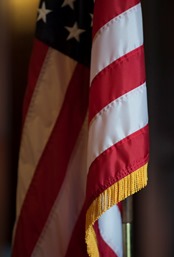
LARSON REPORT
WEEKLY NEWSLETTER
Click here to view this Email in your Web browser
March 20, 2014
CONTACT ME
Please feel free to contact me with any concerns or opinions you might
have.
Office Phone: (608) 266-7505
Toll-free Phone: (800) 361-5487
Email:
Sen.Larson@legis.wi.gov
Mailing Address:
State Capitol
P.O. Box 7882
Madison, WI 53707
Web Site:
Find Me on Facebook and Twitter:
COMMUNITY
EVENTS
Supporting our neighbors and being involved in our community is of the utmost importance. Some community events that might be of interest to you and your family are listed below.
Andy Warhol: 10
Portraits of Jews of the Twentieth Century
Date: Now through Sun., March 30
Location: Milwaukee
Description: Experience these brightly-colored creations,
featuring historical figures and renowned luminaries of Jewish culture
from various disciplines. This exhibit is open to the public Monday
through Thursday from 10 a.m. to 4 p.m., Friday from 10 a.m. to 2 p.m.,
and Sunday from noon to 4 p.m. Warhol's large-scale portraits allude to
the grandiosity associated with fame while establishing an intimacy
between subject and viewer. Bring family and friends to experience the
color and 'pop' of this unique suite of works. Guided tours are
available throughout the afternoon along with coloring and scavenger
activities for families.
CLICK HERE or call (414) 390-5730 for more information.
Jewish Museum
Milwaukee (MAP)
1360 N. Prospect Avenue
Milwaukee, WI 53202
Body Worlds & The
Cycle of Life
Date: Now through Sun., June 15
Location: Milwaukee
Description:
BODY WORLDS & The Cycle of Life is the latest exhibition from physician
and pioneering anatomist Dr. Gunther von Hagens. At BODY WORLDS & The
Cycle of Life, you will see the body throughout the human life cycle and
across the arc of aging. More than 200 real human specimens preserved
through Dr. von Hagens' invention reveal the human body in all its
stages, across youth, growth, maturity, and advanced age, and in all its
conditions, from health to distress to disease.
CLICK HERE or call (414) 278-2702 for more information.
Milwaukee Public Museum (MAP)
800 W. Wells Street
Milwaukee, WI 53202
Riverside University High School Spring Musical
Date: Fridays and Saturdays from March 21 through March 29 at 7 p.m.
Location: Milwaukee
Description: One of Riverside University High School's many great traditions is their annual Spring Musical. This year, they will be presenting Dreamgirls--a musical based on the life of music legend Diana Ross and the Supremes. Performances will be Friday, March 21, Saturday, March 22, Friday, March 28, and Saturday, March 29. All performances are at 7 p.m. Show your support for this talented group of students. Tickets are now on sale. For questions or to purchase tickets call Riverside University High School at (414) 906-4900.
Riverside University High School (MAP)
1615 E. Locust Street
Milwaukee, WI 53211
Taste of the Ward 2014
Date: Thurs., March 27 from 5:30 p.m. to 7:30 p.m.
Location: Milwaukee
Description:
Taste of the Ward brings you the very best of local neighborhood
restaurants. Sample dozens of unique and diverse menu items-- hors
d'oeuvres, entrees, desserts--plus enjoy a cash bar stocked with your
favorite cocktails from Indulge. One ticket provides as many tastes from
the restaurant partners as you can manage, so come hungry. New this
year, vote for the best of Taste of the Ward. Guests will have the
opportunity to cast their vote for their favorite restaurant in three
different categories: The Best Overall Taste of the Ward, The Most
Unique Taste of the Ward, and The Most Creative Presentation of the
Ward. Taste of the Ward will take place on Thursday, March 27 at the
Broadway Theatre Center. Not only is this event a party for your taste
buds, but you will also have the opportunity to win some great prizes,
including tickets to Skylight performances, gift certificates to
neighborhood restaurants, and some great bottles of wine.
CLICK HERE for more information.
Skylight Music Theatre
(MAP)
158 N. Broadway
Milwaukee, WI 53202
Art in Bloom
Date: Thurs., March 27 through Sun., March 30
Location: Milwaukee
Description:
Come and enjoy exquisite floral arrangements by top regional designers
on display throughout the Museum's Collection Galleries and in the
feature exhibition Uncommon Folk: Traditions in American Art. Art in
Bloom is a perfect way to welcome spring while expanding and enriching
your own floral and gardening know-how. There will also be guest
appearances, presentations, and lectures offered by celebrity floral
designers and master gardeners.
CLICK HERE or call (414) 224-3200 for more information.
Milwaukee Art Museum (MAP)
700 N. Art Museum Drive
Milwaukee, WI 53202
Rep Lab
Date: Fri., March 28 through Mon., March 31
Location: Milwaukee
Description: The Rep's highly-lauded Intern Ensemble presents its annual short-play festival. Now in its fourth season, the critically-acclaimed performance includes everything from comedy to drama to music and much more. Do not miss this one-of-a-kind night of theater. CLICK HERE or call (414) 224-9490 for more information.
Milwaukee Repertory Theater (MAP)
108 E. Wells Street
Milwaukee, WI 53202
South Milwaukee Recreation Spring Dance Recital
Date: Sat., March 29 at 2 p.m.
Location: South Milwaukee
Description: The South Milwaukee Recreation Department is proud to present the annual Spring Dance Recital. The performance will be on Saturday, March 29 at 2 p.m. Theatre doors will open at 1:30 p.m., at which time audience members may be seated. Plan to arrive at least 15 to 20 minutes early so that everyone may be seated and enjoy the show. CLICK HERE for more information.
South Milwaukee
Performing Arts Center (MAP)
901 15th Avenue
South Milwaukee, WI
53172
Dear Wisconsin Neighbor,
The Assembly is currently in session and is expected to pass a bill--for the second time--that would limit the ability of asbestos victims to seek justice against corporations that knowingly exposed them to dangerous asbestos. Therefore, my colleagues and I have created a petition urging Governor Walker to veto this bill. Continue reading for more about this and other important issues, such as the politicizing of chemotherapy parity legislation and offering greater protections for victims of human trafficking.
Sincerely,

Chris Larson
State Senator, District 7
Urge Governor to Veto for Veterans
 Despite
bipartisan opposition, the state Legislature is expected to approve
Assembly Bill 19 (AB 19), which is designed to protect the pocketbooks
of big corporations that knowingly exposed veterans and workers to
dangerous levels of asbestos. Assembly Bill 19 aims to limit the freedom
of asbestos victims to pursue legal action. This legislation passed the
Assembly, but was changed in the Senate. Since passing in the Senate, it
has been sent back to the Assembly for concurrence.
Despite
bipartisan opposition, the state Legislature is expected to approve
Assembly Bill 19 (AB 19), which is designed to protect the pocketbooks
of big corporations that knowingly exposed veterans and workers to
dangerous levels of asbestos. Assembly Bill 19 aims to limit the freedom
of asbestos victims to pursue legal action. This legislation passed the
Assembly, but was changed in the Senate. Since passing in the Senate, it
has been sent back to the Assembly for concurrence.
Asbestos is a group of naturally occurring minerals that are resistant
to heat and many chemicals, and do not conduct electricity. As a result,
asbestos had previously been used as an insulating material, until it
was discovered to have substantial negative health effects. Asbestos was
used to insulate factories, schools, homes, and ships, and to make
automobile brake and clutch parts, roofing shingles, ceiling and floor
tiles, cement, textiles, and hundreds of other products. Therefore, war
veterans and workers in the manufacturing, mining, or construction
industries are particularly at risk of overexposure to potentially
deadly asbestos.
Veterans and workers can be exposed to asbestos mainly by inhaling
fibers in the air they breathe. This may occur during mining and
processing asbestos, making asbestos-containing products, or installing
asbestos insulation. The inhalation of asbestos fibers by veterans and
workers can cause serious diseases and scarring of the lungs and other
organs that may not appear until years after the exposure has occurred.
Mesothelioma and lung cancer--both of which can result in death--are two
of the more severe lung problems that are caused by overexposure to
asbestos. The Wisconsin Asbestos Victims Network estimates that asbestos
kills at least 10,000 Americans every year, and Wisconsin has the 14th
highest rate of asbestos deaths in the nation.
If signed by the governor, AB 19 will limit the
freedom of victims, a disproportionate number of whom are veterans,
suffering from diseases related to asbestos exposure to obtain justice
in court. According to the Wisconsin Military Order of the Purple Heart,
while veterans represent 8% of our nation's population, they make up 30%
of all known mesothelioma deaths that have occurred in the U.S. Further,
military.com cites that virtually every ship commissioned by the United
States Navy between 1930 and about 1970 contained several tons of
asbestos insulation in the engine room, along the pipes, and in the
walls and doors. The sailors that manned these ships and the men who
repaired them were prime candidates for asbestos exposure. While
asbestos products were discontinued by about 1980, active military
members are still affected by asbestos as hundreds of military
installations were left with asbestos in the flooring, ceiling tiles,
wall insulation, building foundations, and military vehicles. Due to the
negative impact this bill would have on our veterans, this bill is
opposed by nearly every veteran organization in Wisconsin, including the
American Legion, the Veterans of Foreign Wars, and the Wisconsin
Military Order of the Purple Heart.
In the years since this dangerous substance was discovered to have
cancer-causing properties, manufacturing and mining companies have
compiled billion dollar trusts to compensate victims for their illnesses
as a stipulation of filing for bankruptcy. This legislation could limit
victims' rights to pursue a personal injury case against these trusts.
Enacting AB 19 will unfairly tip the scales in favor of large
corporations who knowingly exposed veterans, and other workers, to
harmful asbestos products. We cannot let these money-hungry corporations
skirt their responsibility and get away with harming our brave American
heroes who fought to protect our rights and freedoms. Ensuring victims'
rights is vital to ensure that justice prevails in our legal system and
should not be minimized in order to better serve special interests.
Therefore, I voted against Assembly Bill 19.
This bill has passed in both houses but could still be stopped with a
gubernatorial veto. You can help protect our veterans by urging
Wisconsin's governor to put the rights of veterans and other victims
ahead of corporate profits. Show your support for our veterans by
signing the Veto for Veterans Petition, which can be found at
www.VetoForVeterans.com, that urges the governor to veto AB 19. The
petition states the following:
I support Wisconsin's veterans and other asbestos victims, and
believe we should put their health above corporate profits. Therefore, I
urge Wisconsin's governor to join me in opposing AB 19 by vetoing the
bill.
Click here if you would like to sign the petition urging Wisconsin's
governor to veto AB 19.
Given the urgency of this issue, online signatures are preferred.
However, you can also encourage your family, friends, and neighbors to
show their support by printing a petition and circulating it throughout
your community or across the state.
Click here to download or print the PDF for the Veto for Veterans
Petition.
Additional Protections for Human Trafficking Victims
This week, the Senate passed
bipartisan legislation, Assembly Bill 620, authored by Senators Nikiya
Harris and Jerry Petrowski. It was aimed at reducing human trafficking
and assisting those who fall victim to such a heinous crime. Victims of
human trafficking--children and adults--are taken by force, fraud, or
coercion for labor purposes or sexual exploitation. While many
Wisconsinites would like to think of human trafficking as a problem in
other countries, but not ours, the reality is that these crimes are
happening in the U.S., including in our great state of Wisconsin. In
fact, human trafficking is a criminal industry growing quickly across
the globe, and Wisconsin is not immune to the problem. According to a
recent Milwaukee Journal Sentinel article, in July 2013, 10 children in
Wisconsin were rescued from child trafficking as part of a nationwide
FBI investigation. Further, the number of children rescued was the
second highest state total in the nation.
The bill is made up of a number of components, which are listed below:
-
Forfeiture of Property--This provision targets one of the main motivations of human traffickers: their financial profit. Those convicted of human trafficking risk confiscation of their property, which is one of the more effective ways to deter human trafficking.
-
Changes Definitions to Increase Efficacy--By altering and expanding current definitions related to what constitutes human trafficking, Wisconsin will be able to better protect potential victims. This provision takes away various coercion tools from human trafficking perpetrators so they cannot as easily prey upon children or adults with addictions, who are homeless, or who have unstable or violent home lives.
-
Expanding Victims' Rights--This bill provides greater protections to victims by increasing their sense of security through limits on the courts' ability to prosecute minors engaged in prostitution provided they agree to some sort of rehabilitation or counseling. It also allows all victims of human trafficking to have a prostitution conviction vacated or expunged if it was a result of human trafficking.
Assembly Bill 620 received bipartisan support in both houses. It has
since been sent to the governor for his signature.
Ask Chris
I often have neighbors contact me
looking for my perspective on various local and state issues. I very
much appreciate our neighbors' questions and want to dedicate a portion
of my newsletter to common questions that I hear to maintain an open
dialogue. Please continue reading for this week's question.
Q: How was Senator Fitzgerald able to block the chemotherapy parity
legislation from being voted on in the Senate last week?
A: Typically, intravenous chemotherapy medications are covered under a
health plan's medical benefit. Oral chemotherapy medications, on the
other hand, are generally covered under a health plan's pharmacy
benefits, which usually results in higher out-of-pocket costs for
chemotherapy patients.
Oral chemotherapy medications are becoming the standard course of
treatment for many cancer patients. These medications are less invasive
and pose fewer complications, such as infection, than their intravenous
counterparts. Oral chemotherapy medications also offer an alternative
for patients that have failed to respond to other treatments, including
intravenous chemotherapy. In addition, for some individuals oral
chemotherapy is their only treatment option as there are no intravenous
equivalents to battle certain forms of cancer, such as Multiple Myeloma
and Chronic Myelogenous Leukemia.
To try and remedy this problem, a bipartisan group of legislators
co-authored Senate Bill 300, the Cancer Treatment Fairness Act,
legislation that would ensure chemotherapy patients on health insurance
policies regulated by the state of Wisconsin receive equal coverage for
intravenous and oral chemotherapy treatments. Unfortunately, this bill
was held hostage in a political game last week, much to the detriment of
Wisconsinites battling cancer and their families.
The Senate is governed according to the rules in the Senate Rules and
Procedures policy manual. According to these "Senate Rules," the Senate
President is unable to schedule a bill to be taken up on the Senate
floor on a session day if a future public hearing has also been
scheduled on that bill.
In the case of the Cancer Treatment Fairness Act, it was evident from
various press reports that certain Senate Republican leaders did not
want the bill to reach the Senate floor for a vote. To try and prevent a
vote on the Cancer Treatment Fairness Act, a public hearing was
scheduled on March 11. This enabled Senate Republican leadership to
block Democratic senators from pulling the bill--which had already
received a public hearing in both houses--to the Senate floor for a
vote. Not surprisingly, the public hearing scheduled on the Cancer
Treatment Fairness Act was cancelled once session concluded for the day.
This is a strategy that likely could have been employed this week as
well, had the issue not exploded in the press. One Republican Senate
leader was quoted in a recent Milwaukee Journal Sentinel article as
saying that the blocking technique was being used because the Cancer
Treatment Fairness Act had a "majority of the body [of senators
supporting the bill] but not a majority of the Republican caucus."
However, the Milwaukee Journal Sentinel called through all the
Democratic and Republican senators and found that Democrats unanimously
supported the proposal and 13 out of 18 Republican senators also
expressed support for the proposal, thus proving this claim false.
In the end, thanks to pressure from people with cancer, cancer
survivors, and their families; advocacy groups; Democratic legislators;
and the media, Senate Republican leadership was forced to reconsider
their tactics and schedule Senate Bill 300 for a vote on the Senate
floor. This bill ultimately passed with a vote of 30-2 (one Senator was
absent). However, it still has one more hurdle to clear: passing the
Assembly. My Democratic colleagues and I sent a letter to Assembly
Speaker Robin Vos, urging Assembly Republicans to approve the version of
the Cancer Treatment Fairness Act that has already passed by the Senate.
Click here to view a copy of the letter to Assembly Speaker Robin Vos.
Our family, friends, and neighbors fighting against cancer should never
be forced to forgo treatment as a result of health care coverage
discrepancies that impede access to vital, lifesaving medications they
need. Therefore, my colleagues and I will continue to advocate for these
Wisconsinites until our state joins its neighbors--Minnesota, Iowa, and
Illinois--in passing chemotherapy parity legislation.
Did You Know...?
 You
likely know that Wisconsin is known as the "dairy state" and that
Wisconsinites are often referred to as "cheeseheads." But did you know
that Wisconsin is also home to the first dairy school in the United
States?
You
likely know that Wisconsin is known as the "dairy state" and that
Wisconsinites are often referred to as "cheeseheads." But did you know
that Wisconsin is also home to the first dairy school in the United
States?
The school was established in 1890 at the University of Wisconsin-Madison. While only two students attended the first class, enrollment jumped to 75 within a year after Professor Stephen Babcock developed a test to measure the butterfat content of milk. The "Babcock test" provided an incentive to produce high quality milk and allowed farmers to be paid accordingly.
Stephen Babcock's legacy is still
evident on the UW-Madison campus today as the University boasts Babcock
Hall, the Babcock Institute for International Dairy Research and
Development, and even sells its own brand of ice cream at the Babcock
Hall Dairy Store.
ACA March 31 Deadline Approaching
Are you uninsured? Do you have a family member or friend who is uninsured? Under the Affordable Care Act, which was signed into law on March 23, 2010, eligible Wisconsinites may register for health care coverage through the health insurance exchange. Neighbors looking to start receiving coverage may enroll in the exchange during its open enrollment period. After the open enrollment period for 2014 ends on March 31, Wisconsinites will no longer be allowed to apply for health care through the health insurance marketplace unless they experience a significant life-changing event, which could make them eligible for a special enrollment period.
The first open enrollment period for the health exchange began on October 1, 2013, and ends on March 31, 2014. It is important that everyone who plans to apply for health insurance through this program is aware of this deadline, as those who fail to register by March 31, 2014, will have to wait until the next open enrollment period, which is October 1, 2014, to apply for coverage. There will be information and enrollment session throughout Milwaukee over the next couple of weeks. These events are a great way to learn more about signing up through the exchange.
Click here to view dates and times for these events.
It is required that all U.S. citizens
have health insurance in 2014, and those who do not may be fined as a
result. The Affordable Care Act includes provisions for providing health
care to those experiencing financial difficulties, by offering
low-income participants access to subsidized health care coverage
options, as well as exempting certain low-income individuals from being
fined for not having coverage.
As of February 27, 2014, 4 million people across the United States have
signed up for coverage through the health insurance marketplace. In
fact, a recent Gallup poll found that the number of uninsured adults has
dropped from 17.1% to 15.9% over just the last three months. However, there
are still many others who are eligible for health care coverage, but have yet to apply before the
deadline.
Click here to visit healthcare.gov and
follow the easy steps to apply for coverage through the health care
marketplace.
In 2013, Governor Scott Walker declined federal funds to strengthen
BadgerCare and refused to set up a state-run health insurance exchange
for Wisconsin. The funding for these programs would have been drawn from
a fund that has already been paid into by Wisconsinites through payment
of federal taxes. If Governor Walker had accepted this funding, nearly
85,000 more citizens could have been insured, while simultaneously
saving taxpayers a total of $119 million. On top of this, strengthening BadgerCare would create over 10,000 jobs here in Wisconsin. In order to
move Wisconsin forward both economically and in terms of health care, it
is necessary that we accept federal funding to strengthen BadgerCare.
Insuring more Wisconsinites for less money is not only common sense, but
it is the right thing to do.
March is Women's History Month
March is National Women's History
Month. This is a great opportunity for us to learn more about the women
who played a pivotal role in our nation's history and the endeavor to
obtain equal rights for all. The first steps toward the creation of
National Women's History Month came in February 1980 when President
Carter issued the first Presidential Proclamation declaring the Week of
March 8, 1980, as National Women's History Week. In his proclamation,
President Carter said the following:
"From the first settlers who came to our shores, from the first American
Indian families who befriended them, men and women have worked together
to build this nation. Too often the women were unsung and sometimes
their contributions went unnoticed. But the achievements, leadership,
courage, strength and love of the women who built America was as vital
as that of the men whose names we know so well."
By 1986, 14 states had gone even further by declaring March as Women's
History Month. This momentum and state-by-state action was used as the
rationale to lobby Congress to declare the entire month of March 1987 as
National Women's History Month. This annual tradition has continued
every year since then, and thus National Women's History Month was born.
This year's theme is "Celebrating Women of Character, Courage, and
Commitment."
One such woman of character, courage,
and commitment was Sparta, Wisconsin native Kathryn F. Clarenbach, who
was an important leader of the modern feminist movement right here in
Wisconsin and across the nation. In the mid-1960s she was unanimously
recommended for and began working as chair for the Wisconsin Governor's
Commission on the Status of Women. She was the chair for 15 years and
worked on issues that greatly affected women, including divorce, sexual
assault, and property rights. In 1966, she worked with Betty Friedan to
found the National Organization for Women (NOW) in order to further
speak out on behalf of women nationwide on important issues, such as
equal pay for equal work.
Kathryn F. Clarenbach was not alone in
her pursuits to advocate for women and the issues important to them.
Another inspirational woman was Carrie Chapman Catt who was born in
Ripon, Wisconsin in 1859. She was a strong and independent woman both in
her personal life and her career. Carrie Chapman Catt was also an
advocate for the successful campaign by the National American Woman
Suffrage Association to gain voting rights for women. In 1920, she
founded the League of Women Voters, which still fights for equal access
to the polls today. Another exceptional Wisconsin woman was Theodora
Winton Youmans born in 1863, in Ashippun, Wisconsin. She continued the
work that Carrie Chapman Catt initiated and became the first League of
Women Voters president. Theodora Winton Youmans was also a constant
advocate and leader for the suffrage movement helping to change public
opinion to support women's rights.
These women, and many others, fought
tirelessly to make Wisconsin and our nation a more equal place for all.
However, despite their efforts, Wisconsin still has a ways to go to
accomplish this goal. Women still only make 77 cents for every dollar
men make, which results in women making about $10,000 less annually for
the same work. Since most women are co-breadwinners this has a very
negative impact on Wisconsin's middle-class families.
Another issue women are continuing to fight for is equal rights in
health care. During the course of the last four years, the Wisconsin
Legislature has gone backwards in women's health equality by passing
countless bills aimed at intruding on the relationship between a women
and her doctor. According to the U.S. Supreme Court, women have been
granted a constitutional right to privacy, as well as the authority to
make decisions related to their own body. Therefore, the Legislature
should leave this intrinsically private relationship alone.
Although we have made tremendous strides when it comes to women's
rights, it is important that we are aware of and continue to advocate
for gender equality. I will continue doing what I can in the Legislature
to protect women's rights, including promoting health care access and
patient privacy, and ensuring equal pay for equal work.
Go Panthers!
 Congratulations
are in order for the University of Wisconsin-Milwaukee men's basketball
team on its 2014 Horizon League title and progressing to the NCAA
Division I basketball tournament. The Panthers won the league title with
an impressive run of four wins in eight days, capped by a 69-63 victory
over Wright State in Dayton, Ohio. Further, they will be entering the
NCAA tournament with 21 wins. It is also worth noting that three of the
Panthers' five starting players are from Wisconsin.
Congratulations
are in order for the University of Wisconsin-Milwaukee men's basketball
team on its 2014 Horizon League title and progressing to the NCAA
Division I basketball tournament. The Panthers won the league title with
an impressive run of four wins in eight days, capped by a 69-63 victory
over Wright State in Dayton, Ohio. Further, they will be entering the
NCAA tournament with 21 wins. It is also worth noting that three of the
Panthers' five starting players are from Wisconsin.
The Legislature will recognize the UWM men's basketball team by passing
a resolution commending the Panthers on their tremendous accomplishment.
I hope you will join me in cheering on the Panthers in the NCAA
tournament. They will be playing Villanova at 8:25 p.m. on Thursday,
March 20. Go Panthers!
Take the 2013-2014 Neighborhood Survey
I created a survey for the 2013-2014
Legislative Session asking about various issues that are important to
our community and our state. The input of neighbors is greatly
appreciated. My staff and I will be working hard to deliver as many
surveys door to door as possible. In addition, I
have also made this survey available online.
Click here to download and print a copy of this survey, which you can
return to my office via mail, email, or fax upon completion.
Click here to save a stamp and take the survey online.
I look forward to hearing your views on these important issues!
